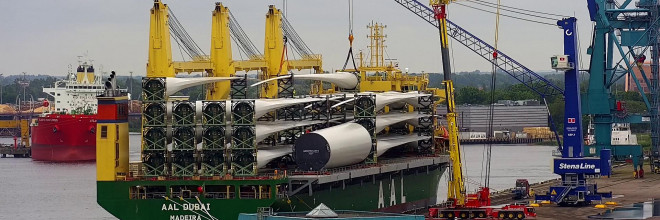Cargo Volume in the Freeport of Ventspils Increased by 14.5% in the First Six Months of 2025

In the first half of 2025, terminals operating in the Freeport of Ventspils handled a total of 4.48 million tons of cargo, which is a 14.5% increase compared to the same period in 2024. This year, cargo volumes have grown across all three major segments – oil products, coal, and Ro-Ro (roll-on/roll-off) cargo.
Half of the total cargo (2.4 million tons), as well as the largest increase year-on-year, came from liquid bulk – the volume of transshipped oil products rose by 66.5%. Ro-Ro cargo ranks second in volume, totaling 808 thousand tons in six months, which is an increase of 20.6%. Coal transshipment from Kazakhstan has also been more active this year – 656 thousand tons, up by 22.7% compared to last year.
Terminals in the Port of Ventspils have also handled various types of wood products (pellets, wood chips, timber) and agricultural products (biodiesel, palm and sunflower oils, grain, malt, rapeseed and bran pellets, peas, etc.), liquid chemicals, peat, and other cargo types. Compared to the previous year, the transshipment of wood and agricultural products has decreased, and due to imposed sanctions, the transshipment of manganese ore has completely ceased.
Acting Freeport of Ventspils CEO Igors Udodovs emphasizes:
"Historically, the Port of Ventspils was developed as a hub for large-scale fossil fuel cargo, with powerful terminals for the handling of oil products and coal. Any geopolitical fluctuations in this cargo transit have a direct and significant impact on Ventspils. It is gratifying that some terminals have managed to restructure their operating models, replacing the historical East–West transit with a model based on ship-to-ship cargo import, storage, processing, and export. At the same time, we continue to move forward so that the Port of Ventspils can expand from its traditional fossil energy transit role to an energy port concept, with a strong emphasis on renewable energy in the broadest sense of the term. We are currently focused on developing an oversized cargo logistics corridor from Ventspils, which will play a crucial role in the development of wind parks in the Baltic states."
The Freeport of Ventspils is the second-largest port in Latvia in terms of cargo volume handled by terminals and one of the country’s largest industrial centers. In 2024, Ventspils ranked third among Latvia’s major cities in terms of production volume, but it took first place in terms of production and exports per capita, significantly surpassing other cities.